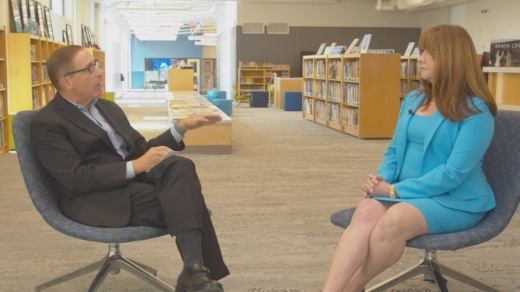Elizalde participated in a conversation led by Texas Tribune co-founder Evan Smith, which was pre-recorded then aired. Historically, the State of the District speech has been delivered by the superintendent at the district's Inspire the Future event.
Elizalde discussed a range of topics, including AISD's relatively low COVID-19 case counts, student achievement measures and enrollment trends.
Coronavirus protocols
Elizalde began by emphasizing the relative success of AISD's handling of delta variant surge this fall compared to other Texas districts.
AISD was among the first to require face masks on district property ahead of the 2021-22 school year, in defiance of an order by Gov. Greg Abbott barring mask mandates by local entities. So far this term, around 1.45% of district students have tested positive for coronavirus, compared to 3.6% of all Texas students, according to state and district data.
"First and foremost, it truly is a community response," Elizalde said. "While our community may not all be in agreement, I think the uniqueness of the community of Austin Independent School District is the ability to wade through disagreements and then come together to support something that you may not be in agreement with but you recognize is in the best interest of the entire organization."
She said the governor's decision to block local mask mandates and Texas Education Agency Commissioner Mike Morath's support of that stance, made it more difficult to protect students and staff.
While Elizalde said she did not expect the governor to mandate masks, she did expect they would not interfere with local entities’ decisions.
Learning loss
Prompted by Smith, Elizalde pushed back on the idea of learning loss—a fear that students fell behind academically during the pandemic.
"The term itself, learning loss, I take issue [with]," she said. "To say that there was loss, I personally think that's offensive, because there's a lot of learning that went on. It just may not be being measured by traditional and standardized assessments."
Results from the spring 2021 State of Texas Assessments of Academic Readiness exams showed sharp decreases in math and reading scores for AISD students compared to 2019, when the tests were last administered. Elizalde acknowledged the decline, and said the district should seek ways to turn students' "real-life learning" from the past two years and "translate them into academic success."
Growing from the challenge
One lesson the district learned during the pandemic, she said, is a deeper understanding of AISD's existing disparities. For instance, shifting to virtual learning revealed that around half of the student body lacked access to reliable and sufficient WiFi.
"I think this needs to continue to become the conversation of just like, 'We have running water. We need all our families to have access to broadband," she said.
Decline in enrollment
While many local school district leaders have pointed toward the pandemic as the cause of recent enrollment decrease, Elizalde pointed out that AISD’s numbers have declined nearly every year since 2012.
Elizalde said gentrification is a driving factor in the decrease.
"We are actually dropping in the percentage of students that are economically disadvantaged in our district,," she said. "They're being pushed out of the city. They can't afford to live in the areas that they formerly lived in, either because of rent, because of housing prices or because of taxes in our area."
She also acknowledged that many families in the district have opted to send their children to charter schools, but said it was important not to "villainize" charters.
"We have to dig down and pick up the mirror, because parents are choosing what they think is most important for their children. That means there's something in some of our schools that we are not providing or that we're doing in a way that is not being received well," she said.





